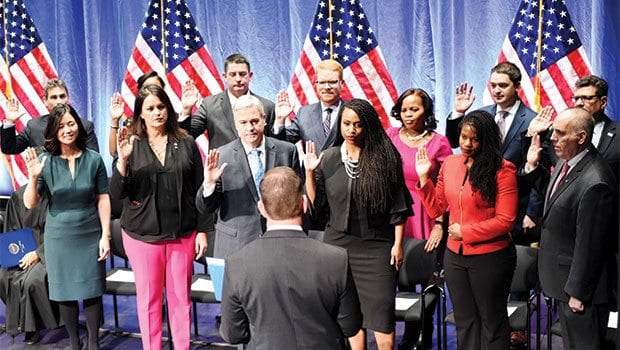
On the morning of Jan. 1, as Martin J. Walsh was sworn into his second term as mayor, so too was the new Boston City Council, considered the most diverse in history with six women of color in the 13-member body.
Three councilors were newly elected this year: Kim Janey of Roxbury for District 7, Lydia Edwards of East Boston for District 1, and Ed Flynn of South Boston for District 2.
District 4 City Councilor Andrea Campbell was elected unanimously by her colleagues to serve as the new president of the council, the first African-American woman to do so.
“I am committed to elevating the experiences of residents who feel like they are not heard in this city,” Campbell said, addressing fellow councilors and others gathered in the Ianella Chamber during the first council meeting of the year. “I’m committed to increasing the council’s transparency and accessibility, and tackling and discussing issues through a racial equity lens.”
Potential bloc
The scene in City Hall was a far cry from 2009, when Ayanna Pressley was elected as the only woman serving on the city council.
“Representation matters,” Pressley said in a media statement, “and our city is better served by the advocacy of my colleagues on the Council.”
Although the women councilors won’t constitute a seven-vote majority, the potential for a six-vote women of color bloc could play a decisive role in the city’s politics.
There’s no certainty that the six councilors will vote as a bloc, but their first test may come as soon as February, when the mayor releases his Boston Public Schools budget. If Walsh continues the trend of the previous two years, budget cuts could be in store for schools. A “nay” vote from the council, which has the power to approve or reject budgets, could send a strong message to the mayor. If the Walsh administration budget contains cuts, how the council votes in response will be an indicator of the political orientation of the newly constituted body.
Both Janey and Edwards have called for full funding of BPS. In a phone conversation with the Banner a couple of days before the inauguration, Janey said, “I want full funding to further close the achievement gap.” After the Jan. 1 city council meeting, Edwards told the Banner, “Public school is vital and I want to make sure our education is fully funded.”
Upcoming challeges
Other far-reaching issues that the council will be grappling with in the new year: the city budget; police body cameras; the growing housing affordability crisis; and the uncertainty surrounding a number of Boston Public Schools issues, including unified enrollment, the looming possibility of school closures and school start times.
“The best way to work together is to provide different perspectives,” said Edwards. “I hope I will be challenged by my colleagues and I hope that I can challenge them. I think that process is what’s going to make a better city.”
As stated throughout her campaign, Edwards said she will continue to work for sustainable and affordable housing so that longtime residents can continue to stay in Boston, along with other areas of improvement.
“I really want to look at innovative transportation, and see our waterfront grow,” she said.
Janey said she will focus on finding an innovative source of revenue to put toward affordable housing and increasing home ownership. She also believes that the city budget should direct more funds toward creating opportunities for young people through summer jobs and year-round employment.
“How we support our young people can go a long way in building our future workforce and tackling bigger issues like crime in our communities,” she said.
When asked about her stance on unified enrollment, a contentious issue brought up in 2017, Janey said she is “concerned” by the remaining unanswered questions and the possibility of “an even more multi-tiered system” and “the needs of special education students not being served as much at charter schools than in public schools.”
Janey also said that she hopes to see more data on the current home-based school assignment system that shows whether or not it truly provides greater equitable access to quality schools.
“One way we can perhaps address inequities is by looking at an assignment system by number of seats, instead of number of schools,” said Janey. Although each family is given an equal number of Tier 1 or Tier 2 schools on their assignment list to choose from, the schools may not be a fair comparison because the number of seats in each school differs neighborhood to neighborhood, she explained.
And although comprehensive data from the Boston Police Department body camera pilot program is yet to be released, all six of the women on the council — Campbell, Michelle Wu, Pressley, Janey, Edwards, and Annissa Essaibi George — have been in favor of, or at least open to, body-worn cameras for the city’s police force.






